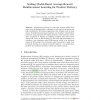Free Online Productivity Tools
i2Speak
i2Symbol
i2OCR
iTex2Img
iWeb2Print
iWeb2Shot
i2Type
iPdf2Split
iPdf2Merge
i2Bopomofo
i2Arabic
i2Style
i2Image
i2PDF
iLatex2Rtf
Sci2ools
ECML
2006
Springer
2006
Springer
Scaling Model-Based Average-Reward Reinforcement Learning for Product Delivery
Reinforcement learning in real-world domains suffers from three curses of dimensionality: explosions in state and action spaces, and high stochasticity. We present approaches that mitigate each of these curses. To handle the state-space explosion, we introduce "tabular linear functions" that generalize tile-coding and linear value functions. Action space complexity is reduced by replacing complete joint action space search with a form of hill climbing. To deal with high stochasticity, we introduce a new algorithm called ASH-learning, which is an afterstate version of H-Learning. Our extensions make it practical to apply reinforcement learning to a domain of product delivery - an optimization problem that combines inventory control and vehicle routing.
| Added | 22 Aug 2010 |
| Updated | 22 Aug 2010 |
| Type | Conference |
| Year | 2006 |
| Where | ECML |
| Authors | Scott Proper, Prasad Tadepalli |
Comments (0)

